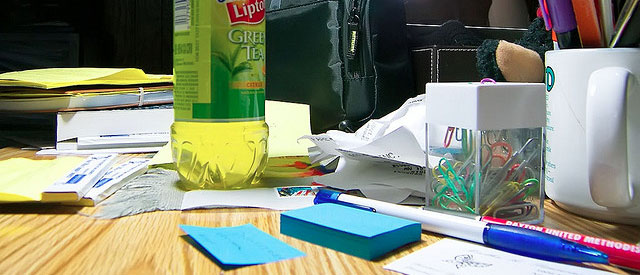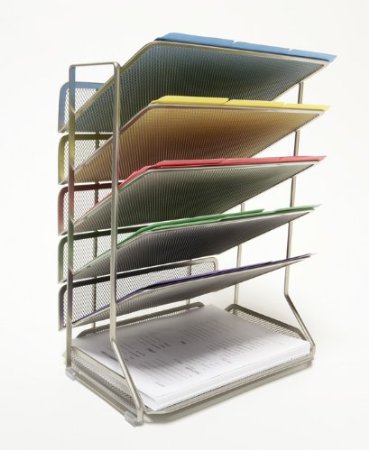
If you’re like me whose desk is always cluttered with papers, cables, rubber bands and other little objects then it’s time to invest in a physical inbox.
Most of us are familiar with one – the paper tray. As much as I prefer going paperless, I’ve found that having a physical inbox where you can temporary store papers and objects is essential for staying organized and tidy.
Quick Summary
- A physical inbox is essential for staying organized.
- Dump anything physical in your physical inbox which can be a shoebox or a paper tray.
- At least once a week, empty your inbox in a GTD-ish way.
Here are a couple reasons why you want to get a physical inbox:
- Avoid having papers all over your office. Instead, have them organized nicely in your physical inbox.
- You have one central location for storing anything physical such as papers, cables and business cards. The less gathering points you have, the more efficient you will be.
- You can easily batch process your things when they are all centrally stored somewhere.
If you’re like me whose office can be a mess with papers, cables, coins, and tiny little objects all over the place – invest in a good physical inbox.
Physical Inbox Structure and System

In the past I used a simple shoebox as my physical inbox. As I was traveling around, carrying a paper tray was inconvenient from country to country. So I went the easy route and used a simple shoebox as my go-to physical inbox. You can justify to yourself that up-cycling is always a good thing ;-)
Now that I’m over my nomad lifestyle and I’m permanently settled, I recently purchased this Seville Classics Office Desk Organizer as my physical inbox for papers and little objects. Together with a couple colorful file folders my office has been clean and stayed clean. There are no more papers wandering around, no more iPhone and headset cables all over the desk and no more lost business cards.
As you can see, this desk organizer has several trays and I like this because it allows me to file and categorize my things in the tray. As such:
- Inbox – The top tray is my inbox. Everything that comes my way will be initially put there such as snag mail, anything I find around the house but can’t store away yet and business cards for people I have to follow up with.
- Financial – The second tray is for anything financial related, such as taxes, credit card agreements and such.
- Bills – Once a bill is paid, I store it there. Most bills can be paid electronically nowadays but for anything one-off it’s nice to have it stored in there.
- Misc – Anything miscellaneous can be stored here such as brochures.
- This tray is empty for me.
- The bottom tray is spacious and flat. I use this for anything outgoing such as snag mail I have to take to the post office or checks I might have to deposit.
The top tray is literally my dumping place. Anytime I get snag mail, I put it in there. Anytime I come back from a conference with business cards, I dump it in there. Anytime I find random little things around the house, I put it in there. It’s easy and simple because it doesn’t require much thought – you find something, you put it in your inbox.
Weekly Process
Of course you have to empty your inbox once a while otherwise you’re just piling “junk”. Once a week, usually every Sunday, I empty my top tray (my physical inbox) and process everything like I would do with an email inbox or OmniFocus inbox. Every envelope gets opened, every business card will be translated into a task for follow up and so on. I decide right away what to do with it in a GTD-ish way:
- Is this still relevant? If not, throw away.
- What’s the next action for this item?
- Where do I store this?
I have found this structure and system to be really useful for me to batch process and reference stuff.
Editor’s Note: Anything from the physical inbox that needs to be stored or reference in future usually gets scanned and filed digitally, and the paper version shredded or boxed.
Next Actions
- If you want to get organized, get yourself a physical inbox.
- A shoebox will do or get yourself this desk organizer.
- Process your inbox at least once a week.
I would like to hear if you have a physical inbox and how you use it. Please leave a comment below.
Photo by iowa_spirit_walker.

If you get frustrated, take a break and try again later. Your brain is like a muscle: it will get stronger while it “rests” and next time you try, it will be easier. The more often you “work out” your brain, the stronger it gets. And you will feel so good when you finally finish the project!
I do something quite a bit different. I don’t have anything like an Inbox or Misc box–anything that generic would turn into a junk pile that I would never deal with. I also don’t play well with GTD at all because it’s too structured for me.
Instead I have six boxes for home:
* Paperwork day. This is primarily for bills, but may include other paperwork that I just want to do all at once. Also in the box is a batch of envelopes and a check pad. On paperwork day, I pay the bills, then file what I need to save or recycle what I don’t need.
* Sinhollow. That’s the novel I’m currently working on. It has a couple of quick reference sheets of paper like cast of characters in case I can’t remember a name, timeline, names of planets. When the novel is done, I’ll pull everything and recycle and create a new marker folder for the next book.
* Calendar Activities. This is for dated material that I could never figure out what to do with. A doctor gives a test form for an appointment next year. Or tickets to a show in November.
* Cruise. Includes reservations, packing lists, etc. The box will become something else after it’s no longer needed.
* A separate, upright basket for current activities. At the moment, it just contains the phone book.
* A recycle box (a large milk crate that sits on the floor). Any paperwork that isn’t filed, goes in there. When it’s full, I’ll pull the bottom out and trash it. It’s a get out of jail free card in case I do need something, though chances are I won’t.
I too have a single in-tray, which I clear daily – either doing, filing or placing each in a classic GTD style tickler file. I’ll empty today from the tickler file into the in-tray first. This works well for me. Back in the day, my in-tray was just a really bad, messy temporary filing system. Having more of them made it worse, and I’d usually spend half a day once every few months filing and processing stuff which should have been done weeks earlier. These days it takes a couple of minutes each day to clear and process, and I’m always up to date.
Is the top tray (“inbox”) big enough for a lot of paper? I understand the process of ordering “down” from top to bottom, but in my case there is so much stuff lying around that I cannot even get started.
It’s funny to me, by the way, that I’m reading your blog post about getting paper work cleaned up while procrastinating from cleaning up my paper work ;)
Better get to it.
I am using a simple tray on my desk at work and following GTD. I put all stuff in my inbox and clear this box daily close to finish. I don’t like more than one box or tray like you have. Everything gets processed out of one box into my tickler file or my reference folders etc.
The same at home. One inbox, cleared once a month into reference material folders or scanned.
By the way I am using the following tickler file. it is divided into month and days. Much easier than a hanging folder. I am using this file same ways as in GTD mentioned. Everyday the items will go from my tickler file into my inbox and are processed during the day. Perfect for the office as it hardly required any space.
https://www.amazon.com/Globe-Weis-Everyday-Letter-Monthly-5EDF/dp/B000GAVGHK/ref=sr_1_sc_3?ie=UTF8&qid=1360754216&sr=8-3-spell&keywords=filde+folder+day+and+month&tag=acleint-20